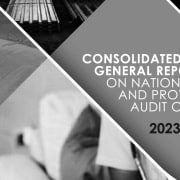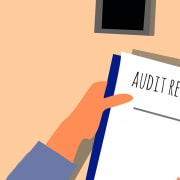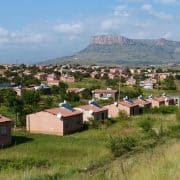|
Getting your Trinity Audio player ready...
|
Auditor-General (AG) Tsakani Maluleke has briefed Parliament’s Standing Committee on the Auditor-General on steps her office would take to audit the disaster relief funds allocated to KwaZulu-Natal and the Eastern Cape. The committee had asked her to present the framework the Auditor-General of South Africa (AGSA) would use to monitor the use of the relief funds in the affected areas.
The committee convened the meeting after President Cyril Ramaphosa’s declaration on 18 April of a national state of disaster in the two provinces, caused by devastating floods. All parts of KwaZulu-Natal (KZN) were affected, Ramaphosa said, with the worst flooding across the entire eThekwini metro and the districts of iLembe, Ugu, King Cetshwayo and uMgungundlovu. In the Eastern Cape, particularly in the districts of Alfred Nzo, Joe Gqabi and OR Tambo, roads, bridges and houses were extensively damaged.
Relief would be provided through a series of interventions rolled out in three stages – immediate humanitarian relief, stabilisation and recovery including rehousing people and restoring surfaces, and reconstruction and rehabilitation.
Multi-stage audit process
The parliamentary meeting took place on 19 May, and Maluleke will hold another briefing with the committee today, 25 May.
The audit process had three elements, she said:
- Prevention (engagement with auditees on the importance of internal controls). In this regard, the KZN Provincial Treasury had indicated that it would be pre-assessing awards at the procurement stage;
- Detection (identification of high-risk transactions and processes and reporting to management);
- Reporting (communication of findings to Parliament).
All four sources of funding will be considered, said Maluleke. The sources are re-prioritisation in existing national, provincial and municipal budgets, disaster relief/response conditional grants, re-allocation of other conditional grants, and use of the contingency reserve for 2022-23.
In the provinces the AGSA’s focus will be on human settlements, education, social development, public works and health. Regarding KZN local government, the eThekwini Metro, Ugu District, Umgungundlovu District, uThukela District, King Cetshwayo District, uMkhanyakude District, iLembe District and Zululand District will come under scrutiny. In the Eastern Cape the AGSA will home in on the OR Tambo District.
Auditors have so far identified, through confirmation from accounting officers, the following amounts to be scrutinised:
- KZN: R1-billion (human settlements – R922-million, social development – R90.7-million.
- National departments: R8.75-billion (South African Social Security Agency R85-million, Department of Water and Sanitation – R65-million, Sanral – R5.7-billion, Prasa – R2.9-billion).
“Thus far, we have no confirmation of amounts in local government and other departments where activities occurred. Written confirmation of the budget and expenditure will be obtained from all the respective accounting officers,” added Maluleke.
In terms of the audit, this will be a normal process – that is, conducted by selecting high-value/high-risk transactions. These transactions will be subject to close scrutiny and findings and recommendations will be shared promptly with accounting officers, for their formal response. The responses will be evaluated and the resulting audit findings will be finalised.
“Accounting officers must safeguard resources, deploy those resources so that they meet their intended purpose, and do this in a matter that is efficient and cost-effective. That is the job of accounting officers,” she said.
The real-time audit team includes fraud, information-technology and sector-specific experts who will support the regulatory auditors by providing relevant insights on risks and operations relating to the disaster relief funding.
The AG has confirmed that the report will be available in August.
“Focused and meticulous audit”
A real-time audit is an early audit aiming to prevent, detect and report on the findings to ensure an immediate response to prevent leakage, potential fraud, and wastage. Real-time audits equip accounting officers and accounting authorities of public institutions to act quickly on weaknesses in controls and prevent further losses. A real-time audit also enables immediate oversight and consequence management.
However, such an undertaking is still reactive, said Maluleke, and transactions must take place for the audit to provide independent assurance that they were performed correctly, that purchased goods or services were of the right quality and that they reached the intended beneficiaries.
“We have an important role to play in providing independent assurance that public funds are accounted for and are being used as intended,” she said. “Our … teams will conduct a focused and meticulous audit to ensure that any potential fraud, wastage, and theft are identified and reported immediately to accounting officers, who as the appointed stewards over public funds, must take the necessary corrective action.”
Committee members were encouraged by the AG’s positive attitude – but they rightfully drew attention to the fact that emergency supply contracts entered into by municipalities in terms of Municipal Supply Chain Management Regulation 36 are a major source of corruption and maladministration.
Transparency and accountability must be upheld, even in the midst of a crisis, said Maluleke. “Clean governance and accountability do not fall away because of the emergency, however catastrophic.”
The audit will be updated as it progresses, she said. “The work has begun and we are already under way.”
Lessons learned from Covid-19 funds disaster
AGSA would draw on lessons learned from the Covid-19 pandemic, Maluleke said, and from international examples of states responding to crises or undertaking complex projects within a short period. In particular, it would draw from China’s oversight of the Beijing Olympics, which showed that real-time auditing helped when other role-players, including law enforcement and investigative bodies, also played their parts.
The real-time audits conducted in 2020, after the outbreak of Covid-19, found key weaknesses that must not be repeated. These included:
- reconciliation and tracking of transactions;
- weak internal preventative controls;
- continued deficiencies in supply chain management;
- technological weaknesses;
- poor record-keeping;
- poor quality of service and goods.
Blowing the whistle before corruption happens
“Fingers have already been pointed at the government for failing to protect communities from the effects of climate change, for relying on inadequate infrastructure and for making no plans to ensure their safety, following similar floods and events in the past,” said Karam Singh, Corruption Watch’s executive director, in April 2022. “But what is startling are the red flags with regard to fears around impending corruption in the disbursement of relief aid and development contracts to rebuild the battered communities.”
This time around, he added, civil society broadly, business and beyond are blowing the warning whistle on potential corruption before it has even happened.
“We must remember that following the National Treasury’s publication of data relating to Covid-19 spending, investigative journalists were able to uncover the irregular spending on the National Health Insurance communication strategy that became the Digital Vibes scandal,” said Singh.
Thus, the best way to ensure that funds are correctly allocated and spent is to have systems in place that allow the government, oversight bodies and civil society to monitor that allocation and spending. And for effective monitoring to take place, there needs to be transparency in the system by way of publication of the information.








